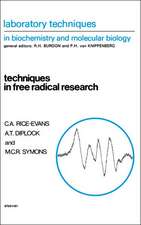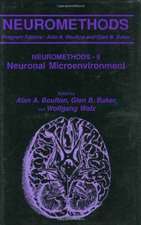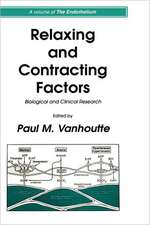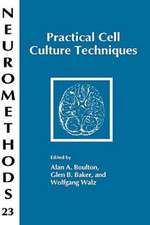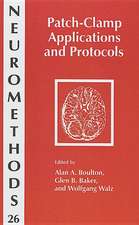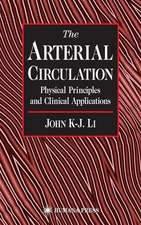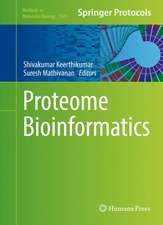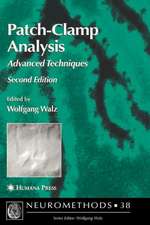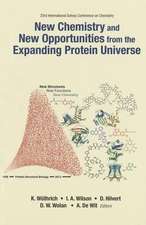Integrative Physiology in the Proteomics and Post-Genomics Age
Editat de Wolfgang Walzen Limba Engleză Hardback – 22 mar 2005
| Toate formatele și edițiile | Preț | Express |
|---|---|---|
| Paperback (1) | 718.65 lei 6-8 săpt. | |
| Humana Press Inc. – 5 noi 2010 | 718.65 lei 6-8 săpt. | |
| Hardback (1) | 729.26 lei 6-8 săpt. | |
| Humana Press Inc. – 22 mar 2005 | 729.26 lei 6-8 săpt. |
Preț: 729.26 lei
Preț vechi: 767.63 lei
-5% Nou
Puncte Express: 1094
Preț estimativ în valută:
139.54€ • 145.69$ • 115.49£
139.54€ • 145.69$ • 115.49£
Carte tipărită la comandă
Livrare economică 04-18 aprilie
Preluare comenzi: 021 569.72.76
Specificații
ISBN-13: 9781588293152
ISBN-10: 1588293157
Pagini: 269
Ilustrații: X, 269 p.
Dimensiuni: 178 x 254 x 24 mm
Greutate: 0.75 kg
Ediția:2005
Editura: Humana Press Inc.
Colecția Humana
Locul publicării:Totowa, NJ, United States
ISBN-10: 1588293157
Pagini: 269
Ilustrații: X, 269 p.
Dimensiuni: 178 x 254 x 24 mm
Greutate: 0.75 kg
Ediția:2005
Editura: Humana Press Inc.
Colecția Humana
Locul publicării:Totowa, NJ, United States
Public țintă
ResearchCuprins
From Functional Linkage to Integrative Physiology.- Functional Genomics.- Electrolytes and Acid-Base Physiology.- Circulation and Fluid Volume Control.- Neuroendocrine Networks.- Physiology and Behavior.- Neural Circuits and Behavior.- Physiological Determinants of Consciousness.- Physical Activity.- Biochemical Adaptation to Extreme Environments.- Repair and Defense Systems at the Epithelial Surface in the Lung.- The Zebrafish As an Integrative Physiology Model.- Curriculum Design for Integrative Physiology.
Recenzii
From the reviews:
"This book, authored by 19 expert contributors, introduces its reader to that fresh enlightening viewpoint. It should help design curricula and identify learning objectives of both medical students and professional physiologists. … As a conclusion, ‘this book represents the leading edge of an exciting development in biological science: the re-emergence of integrative physiology as an organizing principle.’ I agree." (William H. Wehrmacher, Trends in Endocrinology and Metabolism, Vol. 17 (5), 2006)
"This book, authored by 19 expert contributors, introduces its reader to that fresh enlightening viewpoint. It should help design curricula and identify learning objectives of both medical students and professional physiologists. … As a conclusion, ‘this book represents the leading edge of an exciting development in biological science: the re-emergence of integrative physiology as an organizing principle.’ I agree." (William H. Wehrmacher, Trends in Endocrinology and Metabolism, Vol. 17 (5), 2006)
Textul de pe ultima copertă
The advent of molecular techniques has shifted the focus of physiology from its traditional role as an integrative science concerned with the study of regulatory mechanisms leading to adaptation and homeostasis, to a field preoccupied with the problems and challenges inherent in those techniques. In Integrative Physiology in the Proteomics and Post-Genomics Age, internationally recognized researchers highlight the major questions and accomplishments of modern physiological research and demonstrate that modern molecular methods can well be incorporated and strengthen the original integrative perspectives of physiology set out by Claude Bernard's concept of the "milieu interieur." Among the critical issues discussed are the place of functional genomics in regulatory physiology, the role of model systems in integrative physiology, the function of neural circuits in behavior and consciousness, and the influence of external challenges to the whole body and the environment on genes. The question of integrative physiology in curriculum design for the health sciences is also discussed.
Perceptive and timely, Integrative Physiology in the Proteomics and Post-Genomics Age bridges the gap between molecular biology and whole body function, establishing the future of physiology as an integrative science based on new molecular insights.
Perceptive and timely, Integrative Physiology in the Proteomics and Post-Genomics Age bridges the gap between molecular biology and whole body function, establishing the future of physiology as an integrative science based on new molecular insights.
Caracteristici
Includes supplementary material: sn.pub/extras


